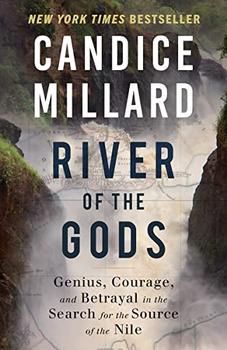Summary | Excerpt | Reviews | Beyond the Book | Readalikes | Genres & Themes | Author Bio

Genius, Courage, and Betrayal in the Search for the Source of the Nile
by Candice Millard
So caught up did Burton become in his passion for languages, that he often forgot that not everyone shared his outsized enthusiasm. In his book Falconry in the Valley of the Indus—one of five books he wrote between 1851 and 1853—he used so many different Indian dialects that he was openly mocked in a British review. "Were it not that the author is so proud of his knowledge of oriental tongues that he thinks it desirable to display the said knowledge by a constant admixture of Indianee words with his narrative, this would be a most agreeable addition both to the Zoology and Falconry of the East," the reviewer admonished him. "We find his affectation all but insufferable, and devoutly wish that he were confined to the use of plain English for the remaining term of his natural life." Burton, however, was not to be shamed or dissuaded from his obsession. "For many years I have been employed in studying the Scindian literature and language," he wrote in reply. "You will . . . find it is the language of a country as large as England." He even wrote a letter to The Bombay Times openly criticizing the language examination process within the East India Company and claiming that, for a serious student, it was not particularly challenging. "The task may appear a formidable one: we can assure him that the appearance is much more tremendous than the reality," he wrote. "Any man of moderate abilities can, with careful, though not hard, study, qualify himself to pass the examination we have described in one year."
Such shrugging dismissal of the notoriously difficult and competitive exams was maddening for Burton's fellow officers, who struggled for years to learn the languages. One man in particular bristled at such casual arrogance, and would come to justify Burton's assertion that "linguists are a dangerous race." Christopher Palmer Rigby was considered one of the most distinguished linguists in the East India Company. At twenty years of age he had passed the language exams for both Hindustani and Marathi, adding Canarese, Persian, and Arabic before his thirtieth birthday. In 1840, while in Aden, he not only learned Somali but wrote An Outline of the Somali Language and Vocabulary, which Burton admired and used extensively when studying the language himself. When Rigby sat for his examination in Gujarati, he had been widely expected to receive the highest score. To everyone's shock, however, not least of all Rigby's, he had lost that honor to Richard Burton.
Many years later, Rigby would find himself in a position to prove to Burton that linguists were not only dangerous, they had long memories. Burton would not sit for the exam in Arabic, a language that he knew so well he referred to it as "my native tongue," until 1855. Soon after taking the test, he would leave the country, assuming that he had easily passed.
Excerpted from River of the Gods by Candice Millard. Copyright © 2022 by Candice Millard. All rights reserved. No part of this excerpt may be reproduced or reprinted without permission in writing from the publisher.
Your guide toexceptional books
BookBrowse seeks out and recommends the best in contemporary fiction and nonfiction—books that not only engage and entertain but also deepen our understanding of ourselves and the world around us.